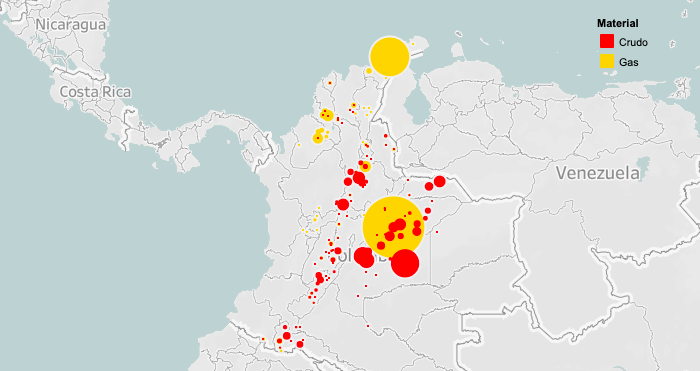The Awá consider themselves “people of the jungle and the mountains”. They make a living from fishing and hunting, grow yucca, plantain and corn. They work with basketry and preserve their mother tongue: Awapít. However, with each day that passes they lose their customs and their territories shrink. The reason for this is always the same: the presence of outsiders, who displace them in order to take their natural resources.
For more than a decade, the struggles against oil exploitation have marked the path of the Awá, Julio says. He recalls that in 2011, during the process of formalizing the Awá’s rights to the reservation, the Awá managed to prevent the construction of 74 wells for oil extraction. Their concern at the time was that 5,800 hectares of their territory would be ceded to the oil companies and they would once again experience the pain of abandoning their lands. But in 2014, the oil industry’s explorations were still ongoing, according to public prior consultation documents from the Ministry of the Interior. Today, in nearby areas, hydrocarbon exploitation continues.
Since 2011, the Awá realised that they had to be informed and prepared to fight. “Not only social protest, but in the legal issue, in education, in information so that they know our rights, and now in the environment,” says Julio.
The same is happening to the communities in Putumayo. Oil companies are present in nearby areas of almost all the reserves of the Awá, Nasa, Kofán, Pastos, Ingas and Embera Chamí ethnic groups. The map of hydrocarbon production at the territorial level, from the Extractive Industries Transparency Initiative of Colombia, shows the municipalities of Putumayo, in the south of the country, with areas in red that show oil extraction.

According to Noel, the oil interest continues in his community of Awá Tatchan, in the Guamuez Valley. He says the destruction of the environment caused by these exploitations has led to food shortages and limited hunting. He adds that multinationals invade their land, coming close to the Awá’s farms, and on several occasions rivers and streams have been contaminated by oil spills, which seriously affect the fauna and crops.
“The squirrels, birds that we know as the panguana, and even fish, are no longer available. The bushmeat, which was naturally consumed, is almost no longer seen, so the communities began to buy beef, pork or fattened chicken,” explains Noel. He says these new eating habits cause the Indigenous culture to dangerously weaken.
Three years ago, continues Noel, “in the community of Mataje Alto, in Ecuador, the Great Awá Family issued a mandate against mining and industrial exploitation of resources. In 2019, the mandate was reinforced and in the demand for respect for human rights and in the defense of the territory.” The Awá people have seen how both the Ecuadorian and Colombian governments “have continued to approve more and more titles for extraction in natural areas inhabited by us”.
Concerns have increased during the pandemic, with many fearing that the need for economic recovery of both countries will be realized through the acceleration of mining and oil concessions. The Awá saw how, during the months of mandatory quarantine from March to September 2020, oil extraction operations continued at full speed and they fear these will continue at an even faster pace post-COVID.
PrintEdilma Prada Vanessa Teteye | Radio Free (2021-04-08T11:51:02+00:00) How oil, cocaine and armed conflict threaten the survival of the Awá people. Retrieved from https://www.radiofree.org/2021/04/08/how-oil-cocaine-and-armed-conflict-threaten-the-survival-of-the-awa-people/
Please log in to upload a file.
There are no updates yet.
Click the Upload button above to add an update.